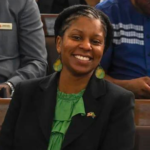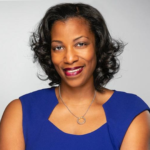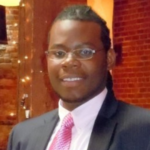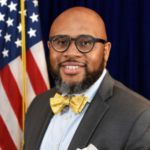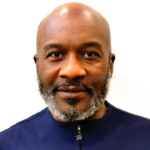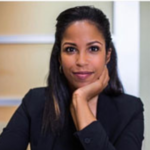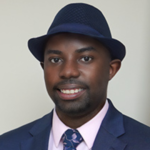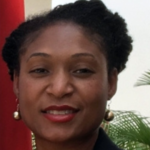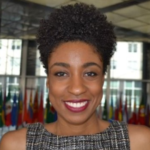With the continued unveiling of deep-rooted inequities in our society, there has been a universal call for greater equity, diversity and inclusion in the workplace – and the American diplomatic corps is no exception.
The United States is at an inflection point on the global stage and diplomacy has never been more important than now to revitalize our standing in the world. But to do this, the American diplomatic community must reflect the diversity of our country – our backgrounds, our beliefs and our values. It not only matters from a representation lens. Diversity of perspectives created through individuals from varied backgrounds and lived experiences leads to more informed policies.
In celebration of Black History Month, Meridian International Center is spotlighting Black diplomatic leadership and amplifying the next generation of Black voices representing the U.S. on the international stage. For a look into the important work and contributions of former Black diplomats from the 1800s to the 21st century, check out our 2021 Black History Month blog series and our spotlights from 2022.
There are numerous rising leaders and this list only touches on a micro-percentage of the diplomatic and international development fields. The focus for 2023 was to highlight those outside of Washington, serving in-country and on the front lines of international relations– field positions that often go unsung and work often unseen directly by the U.S. global affairs community at home.
Selection is based on excellence and leadership, current work in diplomacy or global affairs, and contributions to expertise issues through thought leadership. Thank you to everyone who submitted nominations for this recognition.
Through the Meridian Center for Diplomatic Engagement and our DiplomacyRISE initiative, we look forward to continuing our work with the current diplomatic community and creating a talent ecosystem for the next generation of global affairs leaders. With more than 60 years of close relationships with the diplomatic corps, Meridian is uniquely positioned to convene dialogues among leaders across borders, parties, and industries to achieve consensus and sustainable, mutually-beneficial solutions.
2023
Ayana Angulo
Director, Regional Office of Acquisitions and Assistance | USAID/Regional Development Mission Asia, Bangkok
Ayana Wilkes Angulo has worked in the public sector for the past 13 years as a Foreign Service Officer with USAID. As a Contracting/Agreement Officer, she shapes strategies to select the right organizations to implement USAID-funded development programming, designs agreements that enable the achievement of tangible results in dynamic and challenging contexts and manages those agreements from a business operations perspective. She has managed global health, economic growth, natural resource management, governance, and conflict mitigation programming for the Association of Southeast Asian Nations (ASEAN), the Dominican Republic, Guatemala, Jamaica, Tanzania, Thailand, Tibet, Timor Leste, and Zambia.
Before joining USAID, she worked for consulting firms’ public sector divisions. She supported Ohio’s Department of Jobs & Family Services, the Department of Defense, the Office of Personnel Management, and the U.S. House of Representatives. Angulo has an MPA from Indiana University’s School of Public and Environmental Affairs, speaks Spanish, and hails From Gary, Indiana.
Angulo prioritizes investing in the people working around her because if personnel thrive, she believes we can enhance development progress worldwide. She is particularly interested in retaining talent by creating safe workplaces where people are respected, held accountable for doing their best, and supported to grow professionally. She has a track record of doing this for her teams and wants to influence emerging leaders to do the same. For example, in Tanzania, she led impactful initiatives such as launching the USAID Mission’s leadership series, co-leading the DEIA committee, and revitalizing the Mission’s mentorship program.
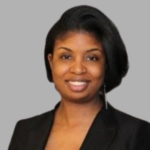 Tahalia Barrett Chang
Tahalia Barrett Chang
Director, Diversity Equity Inclusion and Accessibility (DEIA) Partnerships | USAID Office of the Chief DEIA Officer / Office of the Administrator
Tahalia Barrett Chang is a USAID Foreign Service Officer who has built a 15-year career developing partnerships and delivering results with diverse actors. Her career includes leadership roles as acting Agency Diaspora Coordinator, Director of International Communications and Chief of Staff for USAID’s largest and most technically diverse division.
Early in her tenure, Barrett Chang co-founded the Agency’s Frontier Partnerships group and managed a $40M portfolio of social enterprise and diaspora partnerships involving private foundations started by Muhammad Yunus and Angelique Kidjoe. Later she trained Agency senior leadership to articulate USAID’s work with local counterparts and expanded the Agency’s cooperation with a new group of emerging donor states that contribute billions to development assistance.
Today Barrett Chang is proactively tackling the Agency’s diversity and inclusion landscape, engaging organizations across America to help the USAID field the best team of skilled development professionals to advance U.S. foreign assistance goals. With backing from USAID leadership, she is spearheading new approaches to answer President Biden’s call to advance racial equity and support underserved communities. Barrett Chang is deepening the Agency’s domestic relationships to increase recruitment of geographically and economically diverse candidates for USAID jobs and amplify USAID’s work and partnership opportunities with minority-serving educational institutions and professional organizations.
Overseas Barrett Chang has directed teams and taxpayer dollars in East Africa, Nepal and Jamaica to improve integration with neighboring markets and provide resilience to development shocks. She holds an MBA from the University of Michigan, an MPH from the University of California, Berkeley, and a BS from Cornell University.
Erin Brown
Deputy Director | USAID Bureau for Management, Office of Management Policy, Budget and Performance
Erin Brown is among the youngest members of the Senior Executive Service at USAID, acting as the primary link between the top Presidential appointees and the entire Federal Network operating and overseeing nearly every government activity in approximately 75 Federal agencies.
Since joining USAID in 2012, Brown has played a leadership role in optimizing Agency operations, enhancing the delivery of foreign assistance and promoting respect and accountability in USAID programs. Most recently, sheserved as USAID’s Acting Chief Diversity, Equity, Inclusion and Accessibility Officer, where she led the design and execution of the Agency’s efforts to advance DEIA, including the development and execution of the current DEIA Strategic Plan and the first-ever Equity Action Plan outlining the strategies for advancing equity in its programming and with its partner base.
In her current role, Brown continues her substantial contributions to USAID’s efforts by leading a new Accountability Mechanism. It receives and addresses complaints filed by individuals or groups that experienced environmental, social, or economic harm caused by a USAID project or could potentially experience such harm. Additionally, Brown led an initiative to assess the Agency’s tracking of sexual exploitation and abuse complaints made by program beneficiaries that resulted in establishing the Agency’s new Safeguarding Unit, which centralizes coordination and response to allegations of safeguarding violations in USAID programming.
In 2019, Brown won two Gears of Government awards for efforts she led to increase operational efficiency and effectiveness. She holds a bachelor of arts (BA) degree in Political Science from the Loyola University of New Orleans, a master’s degree in public policy (MPP) from the University of Chicago and a master of arts (MA) in organizational sciences from The George Washington University.
Kevin M. Brown
Foreign Service Officer | USAID Bureau for Humanitarian Assistance
Kevin M. Brown is a dynamic, award-winning development professional with over 17 years of proven success in leading multi-sectoral teams, advising U.S. government development and policy reform, coordinating USAID humanitarian assistance, and guiding program cycle processes.
Brown currently serves as the Deputy Office Director of the Bureau for Humanitarian Assistance’s Office of Technical and Program Quality. He manages the risk assessment and design, M&E, and adaptive learning divisions; and supports the implementation of $192 million in International Disaster Assistance and Food Aid. Brown also co-leads BHA’s climate adaptation efforts and represents the Climate Change Leadership Council. He coaches staff to develop result-oriented strategies and budgets to improve the Agency’s Humanitarian Assistance programming quality.
Prior to this role, he served in USAID/Ghana, where he led the Mission’s new $701 million behavior-led, integrated strategy design and implementation to move Ghana toward self-reliance. Brown also guided Mission efforts to reprogram over $20 million in assistance to support Ghana’s COVID-19 response and served as the lead development coordinator to support U.S. Africa Command’s humanitarian assistance exercises. Brown also served in USAID/Pakistan’s Office of Program Management where he partnered with the embassy and USAID leadership to refocus programmatic direction and negotiate resource requests to advance the U.S. foreign policy directives for Pakistan. As the Director of USAID/West Bank and Gaza’s Strategic Planning and Analysis Office, Brown was the lead liaison between USAID and the Palestinian Authority’s development agency and advanced interagency collaboration, strategic planning, results reporting and coordination with Israeli and Palestinian officials.
Brown also served three consecutive tours at the USAID Mission to Nigeria and the U.S. Embassy’s Mission Disaster Relief Officer. Brown holds a MA in International Business and a MS in Family, Youth, and Community Development, both from the University of Florida and a BA in Business Administration from Florida Agricultural & Mechanical University.
Daniel K. Delk, Jr
Deputy Principal Officer | U.S. Consulate General, Shanghai
Daniel K. Delk, Jr. is the Deputy Principal Officer at the U.S. Consulate General in Shanghai, where he supports a 400-person strong team working to understand, influence, and engage the quarter billion people in China’s eastern hub for innovation, finance, and political experimentation.
A member of the Foreign Service since 2004, Daniel is dedicated to ensuring the next generation of diplomats is prepared to advance American leadership globally. One example is how he guided professional development for Consulate Shanghai’s first and second tour officers and developed a mid-level mentoring program across Mission China. Delk is a mentor with the American Mandarin Society’s African-American China Leaders Fellowship, a founder of the Pickering and Rangel Fellows Association, a trustee of the Shanghai American School, and a former board member of the Andrew Young Center for Global Leadership.
Delk recently led the Political Section of the U.S. Embassy in Islamabad, Pakistan. In addition to multiple Washington-based East Asia policy and crisis management positions, he has served in Beijing, Taipei, and Guayaquil, Ecuador. Daniel earned a BA in Economics and Spanish from Morehouse College and a MPP from the Harvard Kennedy School of Government.
Rockfeler Herisse, Ph.D.
Foreign Service Officer, Energy Team Lead | USAID/West Africa
Dr. Rockfeler Herisse specializes in blended financing for energy transactions and Public-Private Partnerships to advance Power Africa goals in West Africa. His motivation for a career in international development was to help feed the hungry during the famine in Ethiopia. His first overseas assignment was as the Africare Country Representative in Burundi. He managed a USAID-funded democracy, rights and governance project and team focused on leadership and capacity building for civil society and faith-based organizations. While assigned in Washington, DC, he was detailed to USAID/Haiti in response to the catastrophic magnitude 7.0 Mw earthquake. He served as a Strategic Adviser to the Mission Director and coordinated donations and other support from the Haitian Diaspora and other donors to Haitian Civil Society and Faith-Based Organizations.
When the COVID-19 pandemic disrupted world economies and transformed daily work, Dr. Herisse developed concepts to mitigate the secondary impacts on seven targeted nations’ economies and their power sector as manager of a $79 million energy program serving 21 countries in West Africa. Dr. Herisse is currently a Manager for the USAID West Africa Energy Team in Ghana where he leads on energy transactions and policy guidance across 14 countries in West Africa; engages with the Economic Community for West African States (ECOWAS) to provide technical support to the ECOWAS Regional Energy Regulatory Authority and the West Africa Power Pool; and manages relationships with private investors, financial institutions and bilateral donors operating in the energy and agriculture sectors.
Dr. Herisse has many celebrated academic accomplishments, which include: a BS degree from the University of Maryland Eastern Shore; M.Ed. and Ph.D. degrees from The Pennsylvania State and Michigan State Universities, respectively; an Executive Certificate in Public Policy from Harvard University; and an Executive Certificate in Leadership Coaching from Georgetown University. He is author of “Transformative Power of the Caribbean Diaspora” in the book “CARICOM: Policy Options for International Engagement”. He is co-author of the chapter “Constructing Reconciliation, Peace and Freedom: An Ethnographic Approach to Vodou and Christianity” in the book “Vodou and Christianity in Interreligious Dialogue”. He is the co-founder and founding Executive Manager of the National Society for Minorities in Agriculture, Natural Resources and Related Sciences. He is also founding CEO of The Rasil Group—a policy, advisory, development consulting firm. While serving as an internal Leadership Coach, he mentors USAID Payne and Presidential Management Fellows.
Mignon Houston
Diplomat in Residence, Miami Dade County
Mignon Turner Houston has served as a U.S. Diplomat for 15 years. In this capacity, she promoted U.S. foreign policy and partnerships in the U.S. Consulate in Cape Town, South Africa; the U.S. Embassy in Manila, Philippines; the U.S. Embassy in Yaoundé, Cameroon; and the U.S. Consulate in Guadalajara, Mexico.
She also served in Washington, DC, as the Press Officer and Speechwriter for the Special Envoy for Sudan and South Sudan and as the Western Hemisphere’s Public Diplomacy Desk Officer covering 21 Caribbean countries. Based on her Spanish and French language abilities, she was selected to serve as the Acting American Citizens Services Chief in Madrid, Spain, on a temporary duty assignment in 2013 and to lead the Press Team for the multi-national African Growth and Opportunity Act (AGOA) 2015 Summit in Libreville, Gabon.
In her current role, Houston provides guidance and advice on careers, internships and fellowships to students and professionals in the communities they serve. DIRs are available to answer questions and share insight with those interested in Foreign and Civil Service careers, internships and fellowships.
As a foreign language and communications major, she began pursuing a career in journalism with the hopes of working as a bilingual news reporter. One day, her professor asked her a question that altered her perspective of the world: “Did she want to report the news or make it?” Intrigued by the question, she began exploring alternate careers that would allow her to participate in “making” foreign affairs. She received her undergraduate degree from Winston-Salem State University in 2004 as a double major in Spanish and Mass Communications and her Master’s degree in Urban Affairs and Public Policy from the University of Delaware in 2006.
Rashad Jones
Economic Counselor | American Institute in Taiwan
Rashad Jones joined the U.S. Foreign Service in 2008 and is helping blaze a trail for a new generation of diverse and dynamic diplomats to follow. As Political Advisor to the Special Envoy for UN Integrity, Jones’ work centered around promoting essential values such as transparency, accountability, and inclusiveness. Recognizing the need to work with more than just our traditional Western allies to amplify the U.S. message, Jones formulated a strategy for the State Department to bolster the U.S.’s relationships on multilateral issues with key developing countries in Africa, Latin America, and the Middle East. Jones’ initiative on normalizing dialogue with a broader set of partners on important UN priorities helped lay the groundwork for strengthening our cooperation and preventing countries with malign intent from eroding core UN principles, including human rights protections and support for civil society.
Throughout his career, Jones has primarily worked on Asia and Latin American issues. He was Political-Economic Section Chief at U.S. Consulate General Shenyang where he advanced U.S. interests on DPRK sanctions, U.S.-China trade issues, and human rights and religious freedom. His other assignments include U.S. Consulate General Guangzhou and U.S. Embassy Lima and the office of Taiwan Coordination where he covered international organizations, economic, and ESTH issues.
Jones has also made a concerted effort to reach out to college and graduate students to recruit more young, talented officers from diverse backgrounds for careers in his field. He also worked with U.S. embassies to develop research projects for State Department virtual interns related to UN voting coincidence and sustainable development goals. This project simultaneously created opportunities for students to better understand the UN system, while supporting the Department’s interests in gaining a complete picture of member states’ priorities.
Jones has a BSFS from Georgetown University in International Politics and African Studies and a MA in Law and Diplomacy from the Fletcher School at Tufts University.
Deneyese Kirkpatrick
Foreign Service Office/Senior Advisor, U.S. Advisory Commission on Public Diplomacy | U.S. Department of State
Deneyse Kirkpatrick has advanced U.S. foreign policy interests in multiple assignments as a public diplomacy officer while promoting diversity, inclusion, and cross-cultural communication.
In her current assignment as the Senior Advisor to the U.S. Advisory Commission on Public Diplomacy, Kirkpatrick has played an essential role in shaping the future of the U.S. government’s public diplomacy and international broadcasting initiatives through research and reporting. She initiated several efforts to promote Historically Black Colleges and Universities as a platform for public diplomacy engagement. With faculty at the University of Southern California’s Center on Public Diplomacy, she shared best practices in research and curriculum development on diversity issues and how public diplomacy can be used to raise awareness of these issues with foreign audiences.
Kirkpatrick served as the Public Affairs Officer at the U.S. Embassy in Luanda and, from 2015-2018, was the Public Affairs Officer / Director of the American Cultural Center at the U.S. Embassy in Niamey, Niger. During her time in Niger, she served as a lead communication field advisor to senior diplomatic and military officials on counterterrorism matters and revitalized the sister-city relationship between the city of Houston and Angola. Early in her career, she promoted social inclusion in Latin America and is credited for increasing the State Department’s focus on African and Indigenous communities in Latin America.
Kirkpatrick serves as a mentor for the Department’s Pickering and Rangel Fellowship Program. Her previous tours include Cairo, Sao Paulo and Baghdad, with an assignment in the Bureau of International Narcotics and Law Enforcement Affairs for Afghanistan/Pakistan. She has BA from Howard University in Communication, an MA in Latin American Studies from Georgetown University, and a Certificate in Public Diplomacy from the University of Southern California.
Jaime Moody
Deputy Economic Counselor | U.S. Embassy Abuja, Nigeria
Jaime Moody has been a member of the Foreign Service for 12 years and has extensive experience covering emerging markets. As the Deputy Economic Counselor at the U.S. Embassy in Abuja,she manages an international team covering the full scope of the U.S. economic relationship with Nigeria, including macroeconomic issues, climate, trade, and energy policy.
Before her current posting, Moody was the sole economic officer in the Iran Regional Presence Office in Dubai, reporting on humanitarian trade, energy, and sanctions issues. Other assignments include being a member of the Iran Sanctions Team in the Bureau of Economic and Business Affairs’ Office of Sanctions Policy and Implementation, where she worked on the implementation of the Joint Comprehensive Plan of Action (JCPOA). Moody was also U.S. delegate to the United Nations Conference on Trade and Development (UNCTAD) in Geneva, Switzerland, and consular officer at the U.S. Consulate in Monterrey, Mexico.
A recipient of multiple State Department Meritorious and Superior Honor Awards, Moody is a former chair of the Pickering and Rangel Fellows Association and former Program Assistant for the International Career Advancement Program (ICAP). She holds a BA in Political Science from Xavier University of Louisiana; an MA in Global Finance, Trade, and Economic Integration, from the Korbel School at the University of Denver; and a certificate in Contemporary Energy and Nuclear Security Environment studies from the National Defense University. Moody is currently an Ambassador for the Smithsonian National Museum of African American History and Culture and is a regular volunteer with Posse D.C.
2022
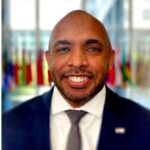
Justin Davis
Foreign Service Officer and Chief of Staff, Bureau of Near Eastern Affairs at the U.S. Department of State
Davis specializes in political negotiations with 12 years of experience at the U.S. Department of State. He has served as the political unit lead at the U.S. Embassy in Havana during the reestablishment of diplomatic relations between the U.S. and Cuba after more than 50 years of limited diplomatic engagement. Additionally, Davis led the State Department’s efforts to resolve Venezuela’s humanitarian crisis drafting the strategy on Venezuela and negotiating with leaders in Latin America and Europe to support the Venezuelan people. He served as a Senior Watch Officer in the State Department Operations Center, State’s 24/7 crisis and emergency response unit, and was on duty during the January 6 riots where he worked to safeguard our domestic democratic institutions. As the Deputy Task Force lead in Doha during Operation Allies Refuge, the largest airlift in history, Davis and his team of 150 federal workers successfully evacuated 70,000 Afghans that came into Doha from Kabul. They stood up an operations center in short order and provided shelter, food, water and supplies to the evacuees and Davis negotiated with the Qatari government to secure safe passage for American citizens stuck in Afghanistan. His next assignment will be at the U.S. Embassy in Lima, Peru to serve as the Counselor for Political Affairs.
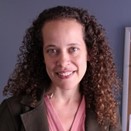
Jessica Huber
Team Lead, Office of Global Programs, Bureau of Democracy, Human Rights, and Labor, U.S. Department of State
Huber has dedicated her career to honoring her Black heritage through international service. At age 16, she accepted a public service award from the Delta Sigma Theta Sorority, and she told the audience that she would pursue her social justice work by moving to Africa. In 2007, she achieved that dream after years of working and traveling to conflict areas across the continent. Huber moved to northern Uganda where she lived and worked alongside local communities recovering from the conflict with the Lord’s Resistance Army. Prior, she represented concerns of communities impacted by conflicts in Africa and the Middle East at the UN Security Council as a Representative for the Quaker UN Office. Huber joined the State Department in 2017 as the Team Lead for Marginalized Populations human rights programming in the Bureau of Democracy, Human Rights and Labor (DRL). Huber has extended her service by founding DRL’s Diversity, Equity, Inclusion and Accessibility (DEIA) Council, which works to improve DRL’s DEIA approach to staffing, enrichment and events. She is a member of the Department-wide Agency Equity Team (AET), an entity tasked to implement the Biden Administration’s Executive Order 13985 on support for racial equity and underserved communities. In her pursuit of equality and justice, Huber has demonstrated that her direct action and service throughout her career are rooted in her heritage and personal principles.
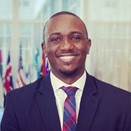
Navarro Moore
Senior Advisor to the Under Secretary for Political Affairs, U.S. Department of State
Moore has over a decade of foreign affairs and national security experience with the State Department in Fiji, Thailand, El Salvador, Australia, Ghana and Washington, DC. He was part of the team that devised a network of third–country evacuation sites during the U.S. Embassy Kabul drawdown and was nominated by the U.S. Secretary of State to receive a Distinguished Honor Award for his work leading an Operations Center team during the 2020 Persian Gulf Crisis. Other signature diplomatic achievements include leading the initial phases of the Department’s response to COVID-19 and coordinating the inaugural U.S.-Kenya Strategic Dialogue. Moore is an avid mentor within the foreign affairs community, an active member of the Pickering and Rangel Fellows Association and the International Career Advancement Program Alumni Association, and a Council on Foreign Relations Term Member. His next post is Deputy Principal Officer in Shanghai following two years of language training.

Yolonda Kerney, D. Min.
U.S. Department of State Diplomat in Residence – DC Metro Region
Dr. Yolonda Kerney joined the U.S. diplomatic corps as a Foreign Service Officer in 2004. She currently resides as a Diplomat in Residence at Howard University’s Ralph J. Bunche International Affairs Center, where she provides guidance and advice on careers, internships and fellowships to students and professionals in the communities they serve. Previously, she served as Counselor for Public Affairs at the U.S. Embassy in the Democratic Republic of the Congo; Public Affairs Officer at the U.S. Mission to Barbados, the Eastern Caribbean and the Organization of Eastern Caribbean States; Public Affairs Officer at the U.S. Embassy in Jamaica; Cultural Affairs Officer at the U.S. Embassy in the Republic of Cameroon; and Economic Officer and Chief Consul at the U.S. Embassy in the Republic of Guinea. She is the recipient of several Department of State Meritorious Honor and Superior Honor awards and the Lois Roth Award for Excellence in Cultural Diplomacy. Before joining the Foreign Service, she served as a music historian at the United States Library of Congress.
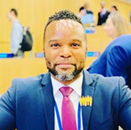
Brandon Jackson
Foreign Service Officer/Regional Labor Officer, U.S. Consulate General, Johannesburg, South Africa
Jackson is currently the Political-Economic Chief and the Regional Labor Officer at the U.S. Consulate General based in Johannesburg, South Africa. As the Department’s sole Regional Labor Officer, Jackson supports interagency collaboration and information sharing among State Department, the Department of Labor, USAID, and U.S. Missions in nine southern African countries (Botswana, Lesotho, Eswatini, Zimbabwe, Mozambique, Angola, Zambia, Namibia, and South Africa) on labor programming and policy. Before this, he was the State Department’s lead in the Bureau of International Organizations for UNICEF and UN-Habitat. In this role, Jackson was responsible for advancing U.S. strategic goals and policies related to children and urbanization at the UN; identifying opportunities for U.S. leadership and initiatives; and representing the U.S. government in their governing bodies. Jackson also worked at the U.S. Mission to the African Union where he largely focused on youth engagement and supporting multilateral solutions across Africa on issues of democracy and governance. Jackson is a member of the Pickering and Rangel Fellows Association and the International Career Advancement Program Alumni Association.

Morgan Limo
Foreign Service Officer, USAID/Uganda
Morgan Limo specializes in program design, management and measurement spanning across many sectors including global health, democracy and governance, education and economic growth. Her work actively measures the effectiveness of foreign assistance, and she is passionate about reducing systemic barriers to inclusive and sustainable development. Limo’s accomplishments have included handling Ebola recovery as the Deputy Program Officer at USAID/Guinea and Sierra Leone; managing the Young African Leaders Initiative (YALI); and helping develop both the Office of Private Capital and Microenterprise at USAID and the Africa and Food Security Congressional Liaisons. She has had assignments throughout Sub-Saharan African in Ghana, Ethiopia, Kenya, Nigeria, South Africa, Tanzania and Uganda. She is a 2015 alumni of the International Career Advancement Program (ICAP) for mid-career international affairs professionals and the Penn Kemble Fellowship at the National Endowment for Democracy. She currently serves as a board member for the Department of Political Science at University of Illinois at Urbana-Champaign, and an Outcomes Director/Board Member at Cross World Africa.
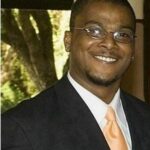
Carlton McLellan, Ph.D
Senior Fellow, Association of Black American Ambassadors (ABAA)
Dr. McLellan is a senior diplomacy and foreign affairs professional and researcher. He holds multiple positions including as a Senior Fellow at the Association of Black American Ambassadors (ABAA) and Senior Associate and Founding Director at Global Ties South Africa. At ABAA, Dr. McLellan oversees The American Ambassadors Project, which is the first comprehensive attempt to compile, organize and report on the lives and contributions of Black Americans who have held the title and rank of U.S. Ambassador. Dr. McLellan has authored several scholarly articles and book chapters about U.S. foreign and diplomatic relations and the legacy of Black U.S. Ambassadors in addition to having developed over 300 knowledge exchange projects for practitioners and students from various countries. He recently completed a two-year assignment as a Senior Advisor to the International Labor Organization’s Office (ILO) for the United States & Canada. Additionally, throughout his career, he has worked or consulted at nonprofit, citizen diplomatic-focused agencies such as Global Ties U.S., FHI 360, the Academy for Educational Development (AED), the Institute of International Education (IIE), and Meridian International Center, all managing U.S. Department of State programs; and at multilateral agencies such as the ILO and the World Bank.
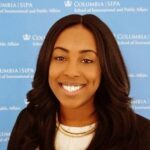
Annah Mwendar-Chaba
Public Diplomacy Officer, Palestinian Affairs Unit, U.S. Embassy in Israel
Mwendar-Chaba was inspired to join the Foreign Service to show U.S. diversity to the world. Her upbringing included both U.S. and Kenya identities which provided her with a unique ability to make connections across cultures – an important skill in public diplomacy. Mwendar-Chaba spent her first two years in New Delhi, issuing visas and ensuring the safety of Americans in India. She arrived in Jerusalem in August 2021 for her second appointment at the U.S. Embassy in Israel where she works closely with Palestinian communities in the West Bank, Gaza and Jerusalem to connect Americans and Palestinians for meaningful exchange, including through U.S. government-funded grant projects supporting civil society development and capacity building. Mwendar-Chaba began her journey into the U.S. Foreign Service after receiving the competitive Charles B. Rangel International Affairs Graduate Fellowship. While she does not yet have her next assignment, she’d love to one day serve in Kenya where her parents were born.
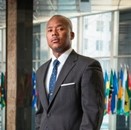
Recardo Gibson
Doctoral Candidate, The Johns Hopkins University – Paul H. Nitze School of Advanced International Studies
Gibson is currently pursuing his doctoral degree in International Affairs with a concentration at The Johns Hopkins University’s Paul H. Nitze School of Advanced International Studies. Previously, Gibson was a Public Affairs Officer in the Bureau of Consular Affairs where he serves as a Bureau Spokesperson. There he developed media and communications strategies for U.S. government initiatives and liaised with the press and civil society to promote U.S. foreign policy objectives. During his time at the State Department, Gibson worked on special assignments including leading the interagency review of the UN Declaration on the Rights of Indigenous People, managing rule of law programs in Democratic Republic of Congo, aiding the U.S. response to the 2016 famine in Ethiopia, and supporting U.S. involvement in Asia Pacific Economic Coordination (APEC) forum meetings. He has received Meritorious Honor and Franklin Awards for his work. Gibson is a Term Member at the Council on Foreign Relations and was previous selected as a U.S. State Department Fellow at International Career Advancement Program (ICAP). Previously he served as a Director at Large on the United Nations Association-National Capital Area (UNA-NCA) Board of Directors.
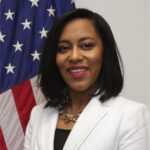 Ariel Pollock
Ariel Pollock
Country Information Officer and Spokesperson, U.S. Embassy in India
Pollock began her career as a Foreign Service Officer with assignments in Ethiopia, Pakistan, New York, India and Washington, DC. She serves as the Country Information Officer and Spokesperson for the U.S. Embassy in India. Throughout her career, she has led political, economic and public diplomacy engagement strategies across countries from media relations to public affairs. In her current role, she acts as the principal advisor to not only the U.S. Ambassador to India but also over thirty federal government agencies and offices and Washington, D.C. leadership on media strategy to advance U.S. government policy objectives in India. As Assistant Information Officer and Deputy Spokesperson at the U.S. Embassy in Islamabad, Pollock led Embassy efforts to counter misinformation about the U.S. government in Pakistani media, ensuring that the American perspective received equal space in the local press and leveling the information playing field. Through her work with the U.S. Department of State’s New York Foreign Press Center, Pollock produced several media briefings and reporting tours to promote U.S. foreign policy messaging in foreign media including encouraging countries to accept more international refugees and promoting LGBTQ+ rights as human rights.














